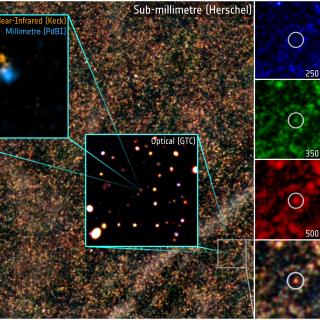Bibcode
Negrello, Mattia; Hopwood, R.; De Zotti, G.; Cooray, A.; Verma, A.; Bock, J.; Frayer, D. T.; Gurwell, M. A.; Omont, A.; Neri, R.; Dannerbauer, H.; Leeuw, L. L.; Barton, E.; Cooke, J.; Kim, S.; da Cunha, E.; Rodighiero, G.; Cox, P.; Bonfield, D. G.; Jarvis, M. J.; Serjeant, S.; Ivison, R. J.; Dye, S.; Aretxaga, I.; Hughes, D. H.; Ibar, E.; Bertoldi, F.; Valtchanov, I.; Eales, S.; Dunne, L.; Driver, S. P.; Auld, R.; Buttiglione, S.; Cava, A.; Grady, C. A.; Clements, D. L.; Dariush, A.; Fritz, J.; Hill, D.; Hornbeck, J. B.; Kelvin, L.; Lagache, G.; Lopez-Caniego, M.; Gonzalez-Nuevo, J.; Maddox, S.; Pascale, E.; Pohlen, M.; Rigby, E. E.; Robotham, A.; Simpson, C.; Smith, D. J. B.; Temi, P.; Thompson, M. A.; Woodgate, B. E.; York, D. G.; Aguirre, J. E.; Beelen, A.; Blain, A.; Baker, A. J.; Birkinshaw, M.; Blundell, R.; Bradford, C. M.; Burgarella, D.; Danese, L.; Dunlop, J. S.; Fleuren, S.; Glenn, J.; Harris, A. I.; Kamenetzky, J.; Lupu, R. E.; Maddalena, R. J.; Madore, B. F.; Maloney, P. R.; Matsuhara, H.; Michaowski, M. J.; Murphy, E. J.; Naylor, B. J.; Nguyen, H.; Popescu, C.; Rawlings, S.; Rigopoulou, D.; Scott, D.; Scott, K. S.; Seibert, M.; Smail, I.; Tuffs, R. J.; Vieira, J. D.; van der Werf, P. P.; Zmuidzinas, J.
Bibliographical reference
Science, Volume 330, Issue 6005, pp. 800- (2010).
Advertised on:
11
2010
Journal
Citations
384
Refereed citations
348
Description
Gravitational lensing is a powerful astrophysical and cosmological probe
and is particularly valuable at submillimeter wavelengths for the study
of the statistical and individual properties of dusty star-forming
galaxies. However, the identification of gravitational lenses is often
time-intensive, involving the sifting of large volumes of imaging or
spectroscopic data to find few candidates. We used early data from the
Herschel Astrophysical Terahertz Large Area Survey to demonstrate that
wide-area submillimeter surveys can simply and easily detect strong
gravitational lensing events, with close to 100% efficiency.
Related projects

Formation and Evolution of Galaxies: Observations in Infrared and other Wavelengths
This IAC research group carries out several extragalactic projects in different spectral ranges, using space as well as ground-based telescopes, to study the cosmological evolution of galaxies and the origin of nuclear activity in active galaxies. The group is a member of the international consortium which built the SPIRE instrument for the
Ismael
Pérez Fournon